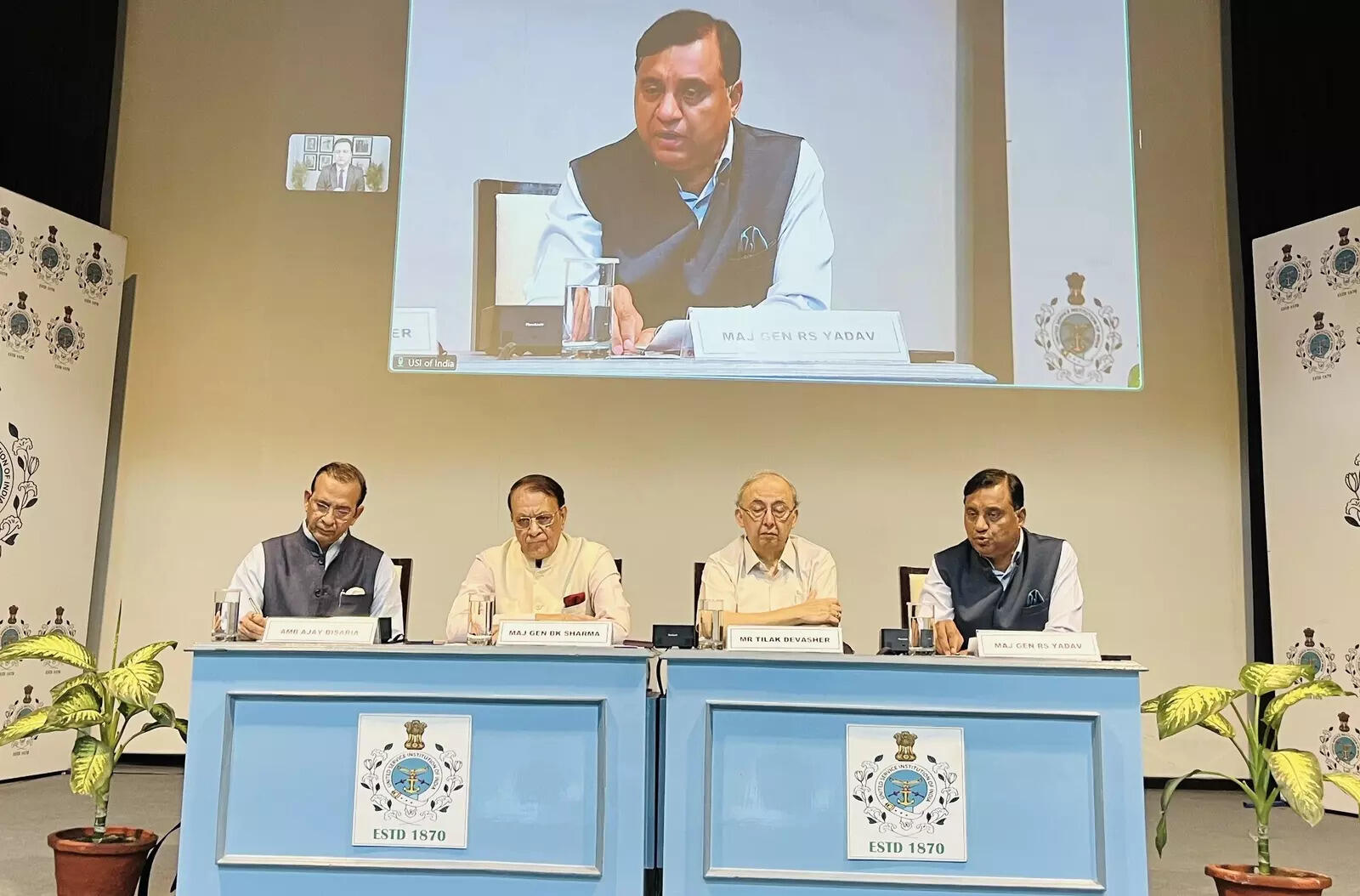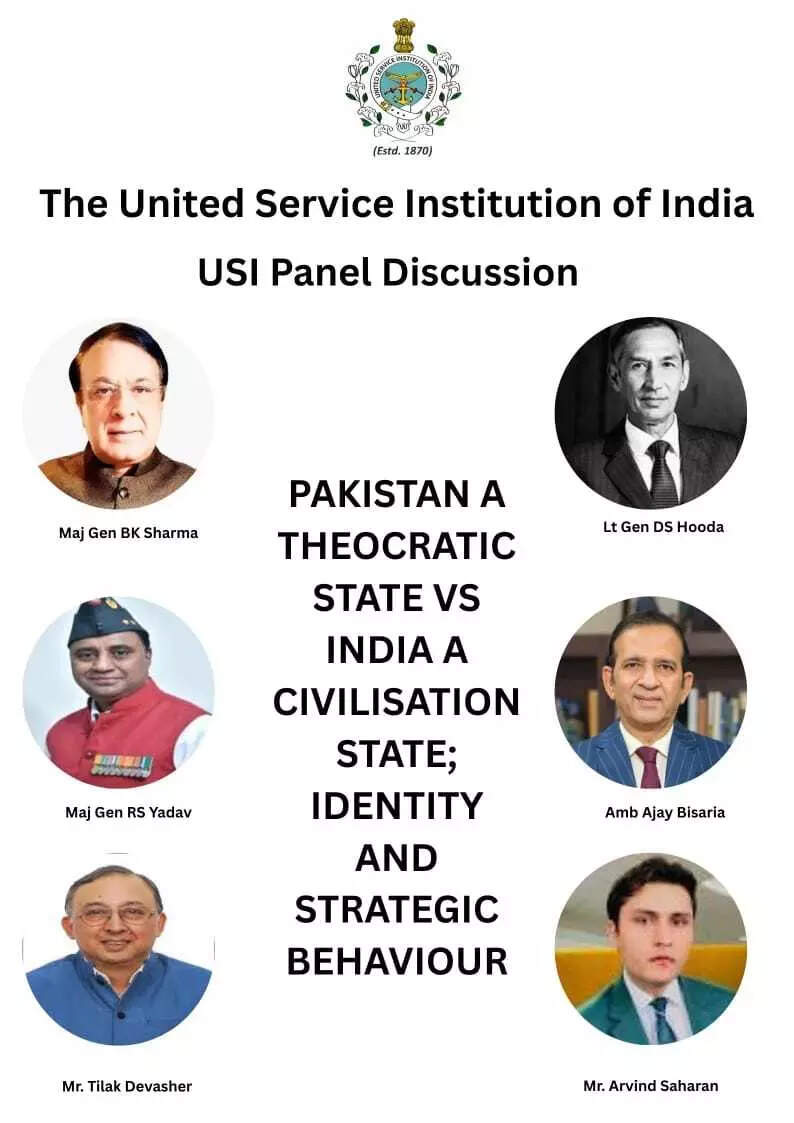
Against the backdrop of heightened tensions following the recent Pahalgam terror attack and renewed debates over national security, the United Service Institution of India convened a timely and critical panel discussion on the topic: “Pakistan: A Theocratic State vs. India: A Civilisational State – Identity and Strategic Behaviour.”
Organized at the USI headquarters in New Delhi, on May 1, and moderated by Maj Gen BK Sharma, Director General, United Service Institute of India (USI), the Panel Discussion brought together prominent voices including Lt Gen DS Hooda, Amb. Ajay Bisaria, Maj Gen RS Yadav, Mr. Tilak Devasher and Mr. Arvind Saharan.
Pakistan’s Ideological Rigidity and Strategic Posture
Maj Gen BK Sharma opened the discussion by highlighting the ideological underpinnings of Pakistan’s strategic behaviour. Citing Pakistan Army Chief Gen. Asim Munir’s recent pronouncements reinforcing the two-nation theory, Sharma noted: “Pakistan’s military continues to see itself as the custodian of the nation’s ideological frontiers, especially with regard to Kashmir.”

Amb. Ajay Bisaria, former High Commissioner to Pakistan, traced the country’s identity crisis to its inception. “Pakistan’s founders failed to articulate a clear vision of the state. Jinnah’s death in 1948 and Liaquat Ali Khan‘s assassination in 1951 left a vacuum that was filled by military and feudal elites,” said Bisaria. “This led to the emergence of a paranoid theocratic garrison state, where identity was defined in opposition to India.”
He observed that Pakistan repeatedly aligned itself with the Gulf Arab world, distancing itself from its South Asian roots, and adopted a model where “Allah, Army, and America” dominated its political imagination. “Even today, the military’s divine sanction to rule continues to prevent democratic evolution,” he warned.
Mr. Arvind Saharan, a keen Pakistan watcher with recent experience on the ground in Pakistan, corroborated this view but also added nuance. “Many Pakistanis admire secularism when they live in the West, but reject it in their own country. There is a deep contradiction between their internal and external aspirations,” he said. He noted that Pakistani civil society remains culturally close to India: “Despite the state’s efforts, Punjabis and Sindhis in particular retain syncretic traditions that echo Hindu civilisational practices.”
India’s Civilisational Ethos and Strategic Thought
Maj Gen RS Yadav underscored that India’s national identity stems not from religion, but from a 5,000-year-old civilisational ethos. “Our thought is shaped by philosophical inquiry, reverence for nature, and the values of pluralism and family. India has endured invasions and colonialism because of its cultural unity and diversity,” he stated.
Yadav noted that India’s strategic culture has traditionally favoured restraint and defence. “But from Kautilya’s Arthashastra to Balakot, India has also demonstrated the ability to be assertive,” he said. He argued that a shift from idealism to realism is underway, marked by India’s military responses in Uri and Balakot and its new emphasis on credible deterrence.
The Two-Nation Theory as Strategic Doctrine
Lt Gen DS Hooda (Retd), who led the Indian Army’s Northern Command during critical phases of anti-terror operations, addressed why Pakistan clings to the two-nation theory. “It justifies not only their existence but also their claim over Kashmir,” he said. “The Pakistan Army frames everything Indian as Hindu. This religious lens fuels asymmetric warfare and proxy terrorism.”
He stressed that jihadist recruitment is driven by ideological indoctrination in seminaries. “This is not just state policy; it’s state identity. The military-jihad complex is now so entrenched that dismantling it would entail an existential cost for the Pakistani state.”
Mr. Tilak Devasher echoed this, citing the findings of the Munir Commission in the 1950s: “Even top clerics couldn’t agree on who is a Muslim. This internal contradiction has eroded Pakistan’s internal stability and made religious minorities perpetual outsiders.” He warned that Pakistan’s global credibility continues to erode due to its support for terrorism and lack of internal consensus.
Can Pakistan Evolve Beyond Theocracy?
On whether Pakistan could transform into a normal state, Mr. Arvind Saharan argued that the educated elite are as complicit as the clergy. “Many intellectuals openly celebrate Indian political developments when it suits them but oppose secularism at home. There is a cultural schizophrenia at play,” he said.
Yet, he also pointed to a rising generation of urban, connected youth who aspire for a more modern Pakistan. “Economic pressures and civil society activism are pushing for change. But entrenched military dominance and institutional Islamisation remain major obstacles,” Saharan added.
Mr. Devasher was less hopeful: “Pakistan cannot abandon its religious identity without questioning the very reason for its creation. That is politically unviable. The army’s cohesion depends on Islam; take that away, and you risk fragmentation.”
Amb. Bisaria offered a middle path: “Pakistan will not cease to be an Islamic state, but what India desires is a normal state—one that doesn’t use terror, where civilians have a say, and which is not obsessed with ideological revenge.”
India’s Strategic Imperatives
The panelists agreed that India must strengthen internal unity and institutional resilience. Maj Gen Sharma warned that Pakistan might be expanding its canvas of conflict. “We must look at the synchrony between General Munir’s statement on the two-nation theory and the Pahalgam terror attack. This is not a coincidence. It may be an attempt at psychological and societal warfare,” he said.
Amb. Bisaria argued for a multi-pronged response: “India should use kinetic force when necessary, but also employ economic coercion, diplomatic isolation, and strategic communication to maintain credible deterrence.”
Gen Hooda stressed the need for a consistent, long-term strategy. “We must move beyond crisis management to conflict resolution. India today has diplomatic heft, economic strength, and military capability. Can we now craft a comprehensive Pakistan policy?”
He also praised the people of Jammu and Kashmir for rejecting terrorism. “This unity undermines Pakistan’s claim that Kashmir is its ‘jugular vein.’ We must continue to support democratic healing in the region.”
The Road Ahead
In his closing remarks, Maj Gen BK Sharma called for a calibrated and long-term national strategy. “MJ Akbar once called Pakistan a ‘toxic jellyfish’—dangerous but lacking direction. We must not let this irritant distract from our larger goals of economic development and global diplomacy. But we must also institutionalise strategic communication to control the national narrative,” he said.
The panel concluded with broad consensus: India must stay grounded in its civilisational identity, practice zero tolerance to terrorism, and employ a sophisticated mix of military, diplomatic, and informational tools to safeguard its sovereignty and societal harmony.
Analysis: A Long History of Conflict, a Clearer Path Forward
Since Partition in 1947, India and Pakistan have fought four wars, endured decades of cross-border terrorism, and engaged in countless diplomatic stand-offs. From the 1965 and 1971 wars to the Kargil conflict of 1999, and more recently the Balakot airstrikes in 2019, the trajectory has been one of sustained hostility, largely driven by Pakistan’s ideological fixation on Kashmir and the two-nation theory.
India, by contrast, has steadily emerged as a stable democracy and a global economic power. Its civilisational ethos provides a foundation for pluralism, while its strategic doctrine has evolved from non-alignment to multi-alignment with a focus on credible deterrence.
The discussion at USI reaffirms that the divergence is not merely political or territorial, but civilisational. While India moves forward with an inclusive, rules-based vision of nationhood, Pakistan remains entrapped in a retrogressive, theocratic paradigm. The onus, therefore, lies on India to stay vigilant, united, and strategically agile in a turbulent region.
Maj Gen BK Sharma aptly summarised the Indian vision in his closing remarks: “We must develop a sustainable, credible long-term approach to dealing with Pakistan. But let us not get unduly distracted by a toxic jellyfish. Our primary focus must remain development, deterrence, and crafting a coherent national narrative.”
(Anoop Verma is Editor-News, ETGovernment)


